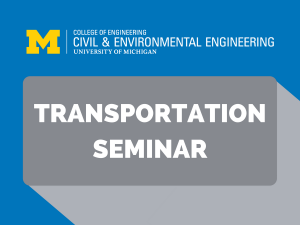Presented By: Civil and Environmental Engineering
Large-scale Traffic Simulation: Recent Advances Based on the Macroscopic Fundamental Diagram
Ludovic Leclercq

This presentation focuses on modelling urban traffic dynamics
with Network Macroscopic Fundamental Diagrams (MFD). Recent
developments in MFD simulation propose two general formulations that
can both be applied to multi-reservoir systems. The first is the classical
accumulation-based formulation when traffic dynamics in each reservoir is governed by a conservation equation. The second is the more recently developed trip-based formulation when vehicle trips have individual lengths but share a single time-dependent mean speed in each region. The different model settings in both frameworks (merge, diverge, entry flow functions) are discussed and compared to microscopic simulations. The integration of multiclass extensions (mainly to represent public transport) is also presented with a particular focus on the resulting traffic dynamics at the reservoir boundaries. The question of MFD model calibration is then addressed considering two central questions: (i) the regional triplength estimation and (ii) the scaling of observations to determine the vehicle accumulations and travel productions. Several applications are discussed in the end: validation of the multi-reservoir setting for the city of Lyon, optimization of ride-sharing services, perimeter control for
reducing network-wide emissions.
Ludovic Leclercq is research director at IFSTTAR and professor in traffic flow theory at the University of Lyon, France.
with Network Macroscopic Fundamental Diagrams (MFD). Recent
developments in MFD simulation propose two general formulations that
can both be applied to multi-reservoir systems. The first is the classical
accumulation-based formulation when traffic dynamics in each reservoir is governed by a conservation equation. The second is the more recently developed trip-based formulation when vehicle trips have individual lengths but share a single time-dependent mean speed in each region. The different model settings in both frameworks (merge, diverge, entry flow functions) are discussed and compared to microscopic simulations. The integration of multiclass extensions (mainly to represent public transport) is also presented with a particular focus on the resulting traffic dynamics at the reservoir boundaries. The question of MFD model calibration is then addressed considering two central questions: (i) the regional triplength estimation and (ii) the scaling of observations to determine the vehicle accumulations and travel productions. Several applications are discussed in the end: validation of the multi-reservoir setting for the city of Lyon, optimization of ride-sharing services, perimeter control for
reducing network-wide emissions.
Ludovic Leclercq is research director at IFSTTAR and professor in traffic flow theory at the University of Lyon, France.